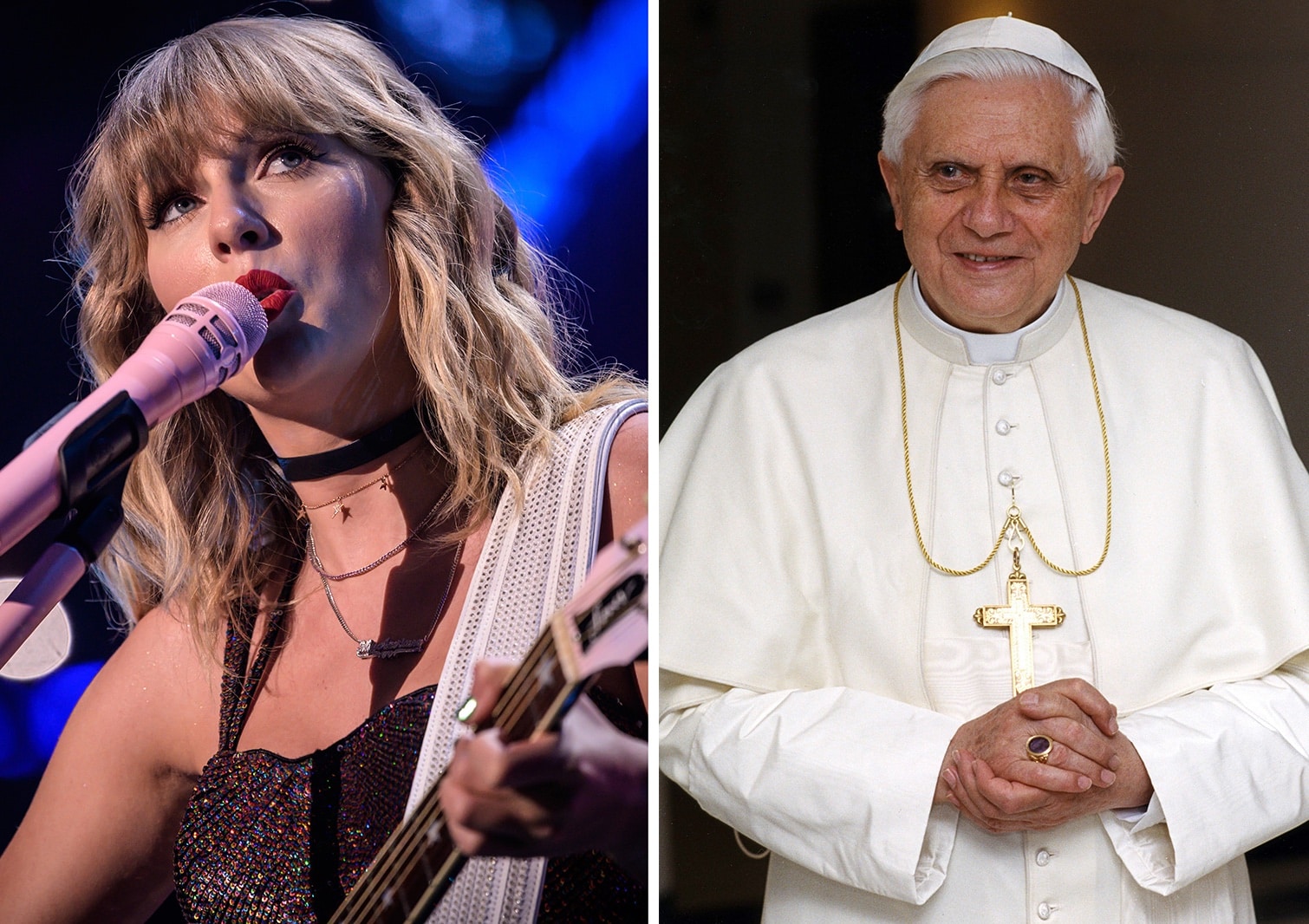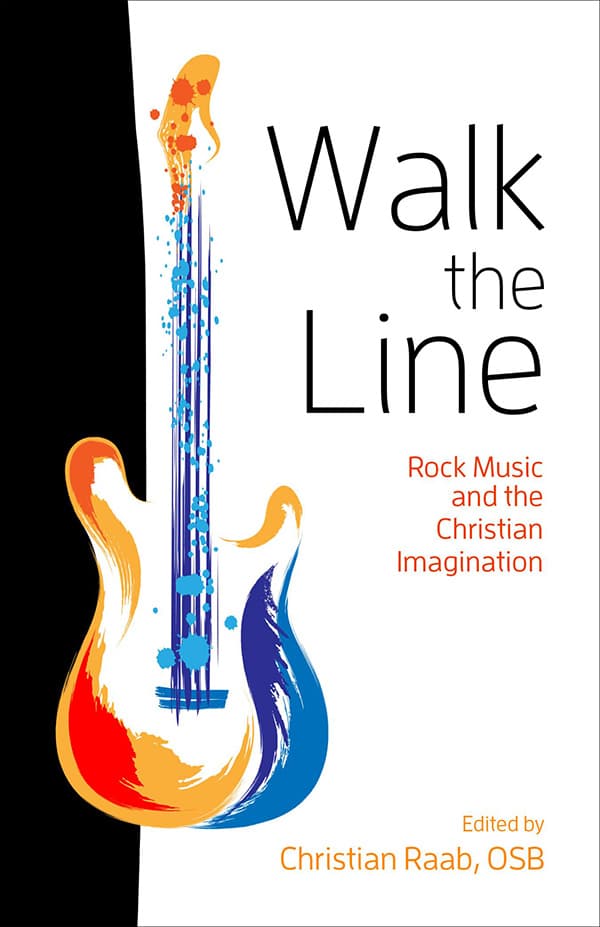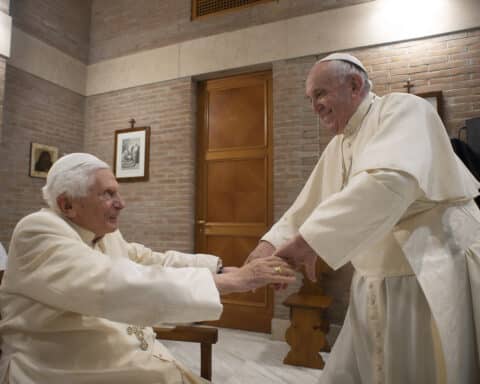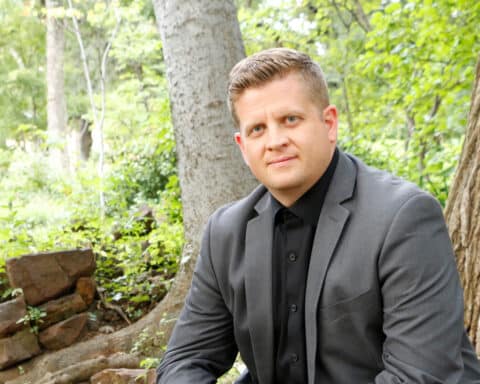A new book explores rock music’s surprising relationship with Christian truth, including connections made between pop icon Taylor Swift’s lyrics and Pope Benedict XVI’s teachings on love.
“It’s meant to model theologically reflective and discerning listening,” Father Christian Raab, OSB, the editor of “Walk the Line: Rock Music and the Christian Imagination,” told Our Sunday Visitor.
The book, released in August, features a collection of 12 essays by Catholic theologians and philosophers that examine the music of different bands and artists, from U2 and Switchfoot to Sara Bareilles and Taylor Swift.
“We’re not baptizing rock music,” Father Raab stressed. “You could say we’re baptizing being a rock music listener or a fan. We’re trying to model how to be a discerning listener who perceives the true and the good and the beautiful in this unlikely source but can also filter it out from error and ugliness.”
Raab, who serves as associate professor of theology at Saint Meinrad Seminary and School of Theology and associate pastor at St. Joseph Parish in Jasper, Indiana, pointed to Bishop Robert Barron of Winona-Rochester, Minnesota, the founder of global media ministry Word of Fire, as an inspiration.
For his early Word on Fire videos, Bishop Barron offered a theological reflection after going to the movie theater, Father Raab recalled. He would show, among other things, how movies could be understood differently with the tools of theology and philosophy.
This book uses the same approach.
The chapter on Taylor Swift and Pope Benedict XVI, Father Raab said, demonstrates the book’s larger goal. In it, Brian Pedraza, an associate professor of theology at Franciscan Missionaries of Our Lady University in Baton Rouge, Louisiana, takes up the theme of love and compares how Taylor Swift and Pope Benedict XVI articulate it.
“Pedraza looks at that — the theme of love in her [Taylor Swift’s] body of work and the evolution of her understanding of love — and then he brings that into dialogue with Benedict XVI’s articulation of love in the document Deus Caritas Est (“God is Love”),” he described. “This is a good example of what the book is trying to do: show how these tools of theological vocabulary could really help us understand how Miss Swift was growing in her understanding of love and that she, at certain times, has followed the pattern.”
The beginning of an idea
The title of his new book, Father Raab revealed, comes from Johnny Cash’s 1956 song “I Walk the Line.”
“The song is about fidelity and remaining true and faithful despite distractions and temptations,” he said. “It’s a good example of how a Christian ideal can also be articulated in a Rock ‘n’ Roll song.”
“More importantly,” he added, “it points to what this book is about and trying to do, which is to show a way of listening to secular music that is faithful and discerning.”
He said his inspiration for the book came during the height of the COVID-19 pandemic, when he found the time to re-listen and rediscover music and songs.
“I had long had an idea, probably in the back of my mind, of trying to bring together theology and music in a way that I would enjoy and which would make sense,” he said.
A wonder-full song
A fan of rock music, Father Raab said he cannot pick only one favorite song.
“One of the songs that I talk about in the book is ‘Stars’ by Switchfoot, and I do love that song,” he gave an example while referencing his essay in the book called “Hope as Rebellion: The Gospel According to Switchfoot.”
“It’s about how faith begins in wonder,” he said of the song. “Aristotle said philosophy begins in wonder, but I think faith begins in wonder.”
He explained: “When we stop to wonder at the night sky or wonder at the gift of existence, of the gift of creation, of the gift of each other — when we stop to wonder, we open the doors to faith.”
A bridge across generations
Father Raab saw the book as potentially appealing to a wide audience.
“Originally, I was thinking — and we pitched the book — as being something for college-aged theology students and older,” he said, pointing to professors who might like to create an elective class with the book.
“Rock music is not the cultural force that it once was, but there are still a lot of younger fans,” he said. “The more and more, though, that I think about this book, I’m hoping that it finds an audience with lapsed Catholics and Christians from Generation X.”
Pointing to God
Father Raab shared two things he wants readers to remember after reading his book. The first, he said, aligns with the intended goal of the book.
“When dealing with the ‘things of the world,’ there’s sometimes a tendency, especially for people early in their time of conversion, I think, to just reject everything,” he said. “Secular art is sometimes one of those things that gets rejected wholesale, but a lot of quality stuff gets lost in such a wholesale rejection.”
“I think it’s better to be discerning than ideological,” he said. “The goal in making this book was to model the discernment of the true, good and the beautiful in a secular source.”
He also highlighted rock artists’ proximity to the truth.
“Having read the book and also what I’ve noticed that early readers are picking out of it, that I am really grateful for, is that the book seems to be a testimony really to the higher aspirations of the human heart,” he said. “The more authentically human that secular art is, the more it points beyond the immanent plane.”
“These rock musicians, the more they are honest and authentic in their attempts to speak their own truth, the more they point to transcendence,” he concluded. “The more they point to God.”






